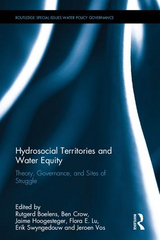PES hydro-social territories: deterritorialization and repatterning of water control arenas in the Andean highlands
Rodriguez de Francisco, Jean Carlo / Rutgerd Boelens
External Publications
(2017)
in: Rutgerd Boelens / Ben Crow / Jaime Hoogesteger / Flora Lu / Erik Swyngedouw/ Jeroen Vos (eds.), Hydrosocial territories and water equity: theory, governance, and sites of struggle, London: Routledge
ISBN: 978-1-13828-884-3
Information
This article explores how payment for environmental services (PES) approaches envision, design and actively constitute new hydrosocial territories by reconfiguring local water control arenas. PES aims to conserve watershed ecosystems by repatterning and commoditizing the link between ‘water service providers’ upstream and ‘water consuming’ populations downstream. Two case illustrations from the Ecuadorian highlands are used to clarify how PES implementation – though presented as if it were apolitical and neutral – weakens locally crafted hydrosocial territories in favour of dominant interests. If consolidated, this depoliticized PES implementation fosters the consolidation of new (market-environmentalist) territories, subjects and interactions, further marginalizing the less powerful upstream communities’ livelihood strategies.


